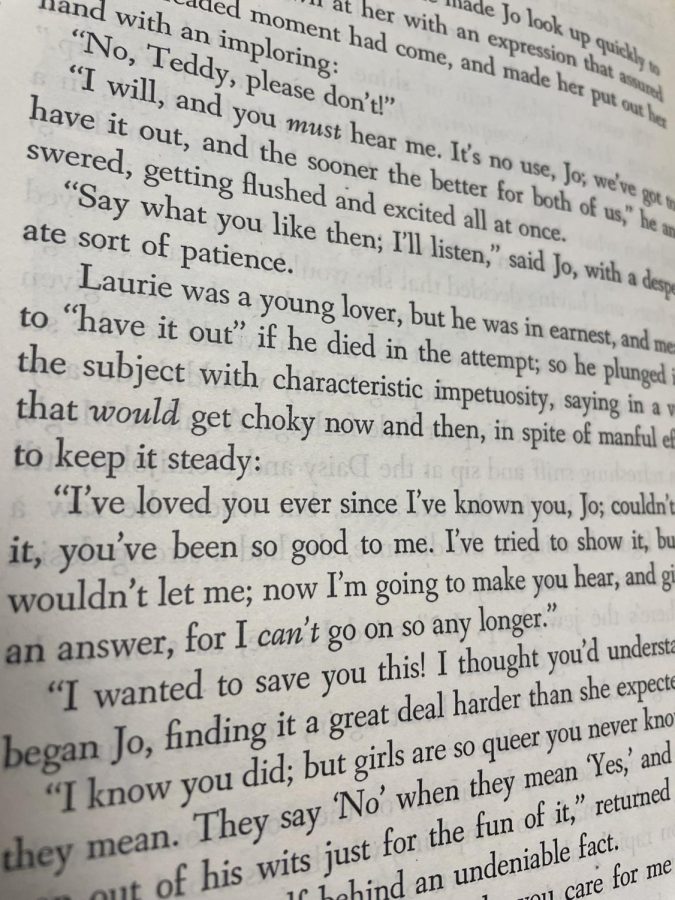Vulnerability and openness defined
Grace Sherban, Campus Editor, defines vulnerability with help from “Little Women”
Mar 27, 2023
This article is the first installment of a two part series on vulnerability and openness.
What is the difference between being open and being vulnerable? This question has plagued my mind for some time and I wanted to find what the difference between these two states of being are and why it matters.
For the sake of brevity, this piece will set out to define vulnerability and openness while providing an example of the former. Part two will give an example of openness and then will try to answer the million dollar question: why does it matter?
Being vulnerable means that we have something to lose, whether it be comfort, security, etc. Choosing to be vulnerable inherently means that people are willing to expose their deepest insecurities and bare their soul with the sliver of hope that things will work out in their favor. If things don’t go as intended, the consequences may be harsh.
Being open is a façade for vulnerability. Openness allows us to grow closer to those around us by sharing our thoughts and feelings but we take out the intimacy. In general, openness is a subcategory of communication and, by not putting any emotional stake into our words, we are keeping ourselves safe.
To help visualize my argument, I thought it would be beneficial to use a movie to help show the difference between my definitions of being vulnerable and being open. There are two scenes from Greta Gerwig’s “Little Women” (because duh) that perfectly illustrate this subtle distinction. As a preface, I do believe that being able to see the difference between these concepts is more pronounced in art since it is up to the artist to make this idea clear to their audience.
The specific scene that depicts a rare moment of vulnerability is the now iconic, “I have loved you ever since I’ve known you Jo” scene where Saoirse Ronan and Timothée Chalamet set out to define their complicated relationship on a picturesque, Boston hillside. Chalamet’s character, Laurie, has been madly in love with Ronan’s Jo since their first encounter and it is during this scene where he can no longer contain his feelings.
The screenplay provides valuable insight into the layers of this scene which start with Laurie and Jo remarking on all of the recent changes that have been happening in their lives. Between Jo’s sister Meg getting married and her other sister Amy traveling through Europe, the two of them watch as their childhood slips through their fingers.
After Jo makes an offhand comment about running away, she looks to Laurie only to find him with a look of pain on his face. She knows what is about to happen and she can’t stop it. Laurie begins to say how he loves her and that he can no longer continue to live if she denies this advance.
Here are links to the movie clip, screenplay and novel because, in every medium, this scene perfectly encapsulates mankind’s vulnerability and my explanation could never do it justice.
This scene demonstrates my definition of vulnerability because, by telling Jo how he feels, Laurie has the potential to lose people he holds the most dear. Not only will he lose Jo, he is putting his relationship with her entire family at risk since they are more akin to siblings than friends.
The audience can see these palpable feelings of love that he has towards her clearly written on Chalamet’s face. He has finally reached his limit in their relationship and he can no longer censor how he feels.
Ronan’s helplessness as she watches him walk away after their encounter is its own form of vulnerability since she did not cower to his impassioned speech. Jo was able to say how she felt even if it meant hurting herself and someone she clearly loves in another capacity.
So why bother bringing up this scene when discussing vulnerability? There is a reason why me and many others cry when watching this scene. It makes me cringe when Jo gently puts Laurie down and the aftermath of that decision. His vulnerability is tangible and he received the worst possible outcome at that moment in time.
When reflecting on vulnerability as a non-confrontational person, I find it hard to fathom that people have the emotional capacity to want something so much that they are willing to give it up completely. For myself and others, the unwillingness to be vulnerable comes from a fear of disrupting the status quo.
Many people can probably relate to that feeling of settling and repressing feelings with the sole reason being that they are scared. It is better to think of a “what if” scenario rather than having a concrete answer that does not match what we want.
Laurie doesn’t fall into this trap. He goes for what he wants despite the risk. We will end here where Laurie’s vulnerability leads him to be alone… for now.













